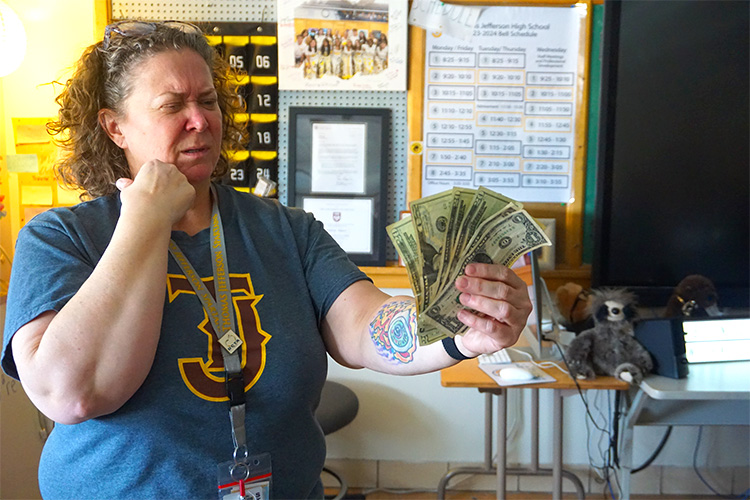
Teachers have varied opinions on the current economic climate. photo by Farah Djama
Many Americans are very pessimistic about the US economy, but several factors indicate the economy is growing, so what is causing this disparity?
Disclaimer: I am not an economist, just a high school student.
Recently, several articles have highlighted an interesting trend: Americans commonly underestimate the quality of the US economy. Many believe that it’s getting worse, when in fact many factors, such as unemployment and consumer spending, show a growing economy. Is this a mistaken belief, and if so, what is behind it? I conducted a survey that asked about a person’s opinions related to the economy to try to better understand this issue, and got 64 responses. (This survey is by no means scientific. Respondents consisted of teachers here at Thomas Jefferson High School, several of my family members, and a few of my parents’ friends.)
A little over half (54.7%) of respondents felt either very or slightly positive about the economy, while 14.1% felt neutral, and less than a third (31.3%) felt either very or slightly negative. Similarly, 39% believed the economy was in either good or excellent shape, 34.4% said it was neither good nor bad, and 26.6% said it was in either poor or terrible shape. In total, 45.3% of respondents believed that the economy is growing, 32.8% believed that it is currently or about to be in a recession, and 21.9% did not know or thought otherwise (many said that they believed the economy is neither growing nor shrinking). Though the responses to my survey showed a more positive perception of the economy than other, more wide-spread surveys, this still shows the disconnect between the economy described by economists and media outlets and the economy seen by many Americans.
One possible explanation could be where people get their information about the economy. Media outlets, social media in particular, are known to overreport on negative events and underreport on positive ones. However, only two people who responded to my survey said that their primary source of economic information was social media, and though one of them held a negative view of the economy, the other was neutral. The majority of respondents got their information from online newspapers or websites, which can sometimes exaggerate the state of the economy with misleading headlines, but those who had a neutral or negative view reported a wider variety of media types than those who had a positive view (62.9% of positive responses selected an online newspaper or website as their primary source of information, compared to 33.3% of neutral responses, and 52.4% of negative responses.) In my opinion, the news and social media is not solely responsible.
I also asked about the main and top three factors that influenced respondents’ views of the economy. For many, the main factor was cost of living, at 48.4%. In second place was inflation, at 20.3%. When this was expanded to include the top three factors, over 75% of respondents selected cost of living as one of the factors that has the greatest impact on their economic views. This is one thing that has not improved with the rest of the economy. While unemployment, for instance, is practically back to pre-pandemic levels according to data from the Federal Reserve Bank of St. Louis (this being reflected in the data I collected: only 9.4% of respondents felt unemployment was the greatest factor influencing their economic opinions), cost of living is not. The consumer price index, which shows the price of a basket of goods (food, clothing, shelter, etc.) for urban consumers, is almost 50 points higher than it was in early 2020, and it seems to continue to be growing, though that growth has slowed in recent months. Unfortunately, disposable personal income has not kept up. This means that people are spending more for the same goods, but their income is no longer able to support them. Something else I want to highlight: while personal income may not have grown a lot, corporate income certainly has. This may also contribute to the difference between how economists and regular Americans see the economy.
So, the conclusion to all of this: the current economic situation is complex. While it seems like we’re unlikely to go into another Great Depression soon, I do think Americans have a right to be concerned and express negative opinions about an economy that might not be working for them.